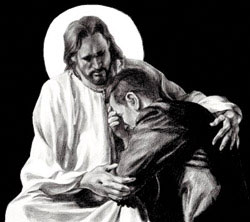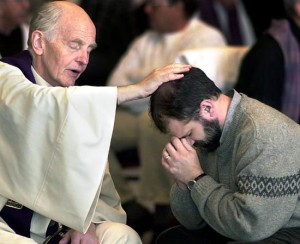USCCA19 Chapter 18 – The Eucharist: Source and Summit of Christian Life
Podcast: Play in new window | Download (Duration: 28:51 — 46.2MB) | Embed
Subscribe: Apple Podcasts | Spotify | Amazon Music | Android | Pandora | iHeartRadio | JioSaavn | Podchaser | Gaana | Podcast Index | Email | TuneIn | Deezer | Anghami | RSS | More
Archbishop Lucas offers insights on the US Catholic Catechism for Adults Chapter 18:
It is called the Sacrament of Conversion because it makes sacramentally present Jesus’ call to conversion, the first step in returning to the Father from whom one has strayed by sin. It is called the Sacrament of Penance, since it consecrates the Christian sinner’s personal and ecclesial steps of conversion, penance, and satisfaction. It is called the Sacrament of Confession since the disclosure or confession of sins is an essential element of this Sacrament. In a profound sense, it is also a called “confession” —acknowledgment and praise—of the holiness of God and of his mercy toward sinful man. It is called the Sacrament of Forgiveness, since by the priest’s sacramental absolution, God grants the penitent “pardon and peace.” It is called the Sacrament of Reconciliation because it imparts to the sinner the love of God who reconciles: “Be reconciled to God” (2 Cor 5:20). He who lives by God’s merciful love is ready to respond to the Lord’s call: “Go, first be reconciled to your brother.” (CCC, nos. 1423-1424, citing Mt 5:24)
The Most Reverend George J. Lucas leads the Archdiocese of Omaha.
For other episodes in the visit our Archbishop George Lucas page
This programs is based on:
More information can be found here.
We wish to thank the USCCB for the permissions granted for use of relevant material used in this series.
Also we wish to thank Bruce McGregor for his vocal talents in this episode.
[ezcc]




 While we should also privately repent of our sins to God, Jesus instituted the sacrament of reconciliation or penance for our own good. Statistics show that Catholic populations have historically had lower rates of suicide and depression than non-Catholics, which many psychologists attribute directly to the healthy practice of vocally confessing one’s sins.
While we should also privately repent of our sins to God, Jesus instituted the sacrament of reconciliation or penance for our own good. Statistics show that Catholic populations have historically had lower rates of suicide and depression than non-Catholics, which many psychologists attribute directly to the healthy practice of vocally confessing one’s sins.
